The first page opened with a poem, "Get There," followed by an editorial from Ethildred B Barry of Germantown, called "Are the Indian Boys and Girls the Friends of Birds?," on the treatment of birds. It continued on the fourth page. Page two opened with a piece describing the contents of the April "Red Man," a report from Susan Longstreth…
1880-1889
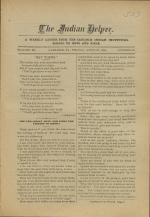
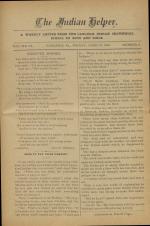
The first page opened with a poem by John G. Whittier, "Granted Wishes," followed by Aunt Martha's story, "Does It Pay to Be Unkind?" about a former Carlisle student's lack of cooperation by not translating business dealings from English after returning home. The second page featured news items about returned students, and a report about "The…
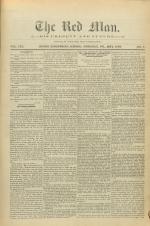
A description of this document is not currently available.
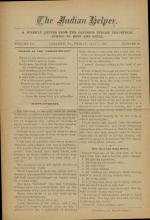
The first page opened with a poem "Legend of the 'Forget-Me-Not, '" "From the Scrap-book of a subscriber;" followed by an article called "Happy Accidents," about the importance of self-help. Next came a piece that continued on the fourth page entitled "How Boys Can Make Money." Page two began with the news of the death of Etahdleuh Doanmoe,…
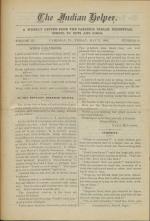
The first page opened with a poem "Work a Blessing," followed by a letter "To the Republic Debating Society," from Nancy McIntosh (Creek) reporting her position as teacher in Eufala, Indian Territory. The last article on this page was entitled "Curiosity," which continued on page four. Page two listed many small news items about returned…
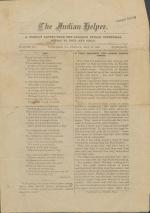
The first page opened with a poem, "Try," followed by a blurb against tobacco use and by "A Visit Through the Lower School Rooms," that reported the activities of students in the lower grades. It continued on page four. The second page bore news of students out in the country, the "disgraceful" portrayals of Indians by Buffalo Bill's Wild West…
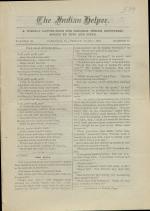
The first page opened with a poem, "The Old Steam Mill," followed by a fictitious conversation between two Carlisle Indian School students, Tom and Ben discussing the merits of work and study. It continued on page four. Page two included news from Pine Ridge Agency, and of the Standing family’s trip to Liverpool, the value of repeating unknown…
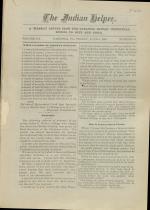
The first page opened with the poem, "What a Barrel of Whiskey Contains,” followed by an article titled “Welcome!” that reprinted Kish Hawkins’ (Cheyenne) address to a visiting group of Wilson College women. In the talk he described the Outing Program, industrial work, academic work and women’s suffrage. The final article on the page was “How…
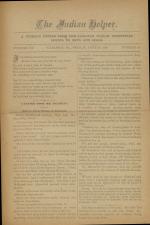
The first page opened with an untitled poem, followed by “A Letter from Mr. Standing: How He Finds Things in England,” a travel diary of the Standing Family’s visit to England. Page two included a report of “An Aged Friend,” and news about visits Dr. Given made to Outing students in Bucks County. It also reported a Department of Interior…
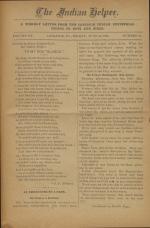
The first page opened with a poem “Selected by Susan Longstreth,” titled “To My Dog ‘Blanco’” by J.G. Holland. The other feature on the first page was an account of “An Indian Girl on a Farm: She Enjoys a Holiday,” that described Adelia Lowe (Sioux) and Frances King’s (Quapaw) trip to Burlington, New Jersey, which continued on the fourth page.…
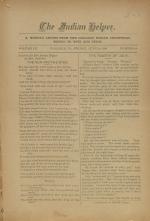
The first page opened with a poem selected “by Mrs. Pettinos,” titled “The Sun and the Wind,” followed by a conversation about the meaning of the 4th of July and how an Indian School student might be influenced to extend his time at the school instead of returning to the reservation. Page two included letters from Frank Lock (Sioux) on outing,…
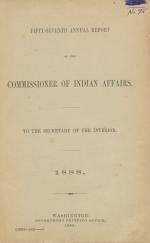
An excerpt from the Annual Report of the Commissioner of Indian Affairs to the Secretary of the Interior for the fiscal year ending 1888, containing the Ninth Annual Report of the Carlisle Indian Industrial School. The report, submitted by Superintendent Richard Henry Pratt, includes a school population table as well as discussions of industry…
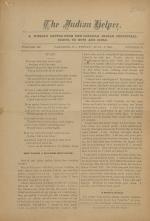
The first page opened with a poem by Sarah E. Eastman reprinted from “Golden Days,” titled “If! If!” followed by the reprinted letter from a Carlisle Indian School student on Outing called “She Wants a Higher Education.” The last piece on the page continues on the fourth page called “A Modern Pueblo” about the process by which a progressive…
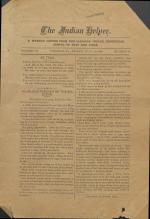
The first page opened with the poem “Be True” followed by an article titled “A Carlisle Teacher on the Big Ocean,” about a trip aboard the Steamer Aurania dated July 6th, 1888 written for the Man-on-the-band-stand by “A Carlisle,” aka Miss Lowe. The article concluded on the fourth page. Page two featured a variety of small newsy paragraphs that…
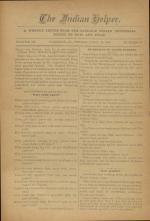
The first page opened with the death notice for Katie Kinshone, one of the Apache babies. It was followed by a poem by Henry Sargent Blake called “Why Come They?” The next item was an article, “No Tobacco in Other Schools,” about the evils of tobacco use and the last piece on the page was an excerpt from an Oneida boy’s outing letter called “…
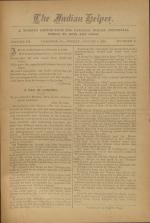
The first page opened with an untitled selection, opening with the line, “A Man of kindness to his beast is kind,” followed by “A Day In London,” dated July 12, 1888, signed by “A Carlisler,” who is later revealed to be Miss Lowe, and continued on to the fourth page. The report included a visit to St. Paul’s Cathedral, Westminster Abbey,…
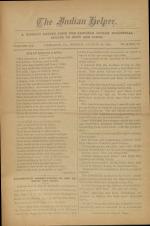
The first page opened with the poem, “What Makes A Man,” followed by an article titled, “Interesting Observations At the Indians’ Own Home” reprinting a letter from Joshua Given (Kiowa) who described the social and political news from the Kiowa and Comanche Agency. He reported the activities of students who had returned home from Carlisle. The…
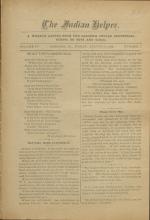
The first page opened with the poem, “What the Flowers Said,” followed by an article reprinted from The Baltimorean, titled "Men Who Were Laughed At,” about how technologies were first spurned. Page two featured several news reports about the band, outing experiences, news from the Rosebud Sioux and Osage Agencies, and an entire column…

The first page opened with a poem, “Good Advice,” followed by a fictional account of a conversation titled “Two Carlisle Boys at Pine Ridge Talk Over the Sioux Bill,” in which two former students, Zack and Tim, discuss the merits of signing the Severalty Act which had been presented to the Standing Rock Sioux Tribe. It concluded on the fourth…
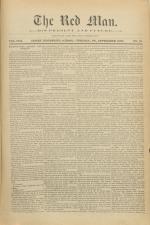
A description of this document is not currently available.
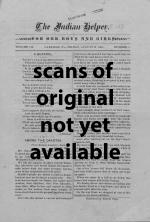
The first page opened with a poem, “Grasp the Nettle,” followed by a reprinted letter to Superintendent Pratt from Conrad Roubideaux (Sioux) titled “Conrad Didn’t Give Up the Ship,” in which he described the hardships of finding work on the reservation. Page two included news that Pratt was out West soliciting signatures for the Severalty Bill…
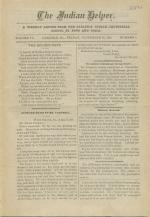
The first page opened with a poem, “The Golden Keys,” followed by a letter from Richard Davis (Cheyenne) who lived in West Grove, PA and ran a dairy farm there. There was an article called “No Wonder Indians Get Along Slowly,” and news from Joseph Schweigman (Sioux) at the Rosebud Agency titled “Willard Married.” The second page featured “The…
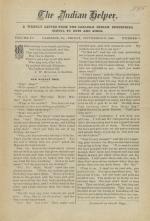
The first page opened with an untitled poem by J. W. Burgess reprinted from Sunshine, followed by “Our Walnut Tree” about the Man-On-the-Band-Stand’s efforts to keep students from picking green walnuts. The second page began with “The Captain,” which described the speech Capt. Pratt made during the student assembly explaining his work…
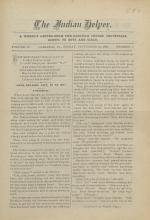
The first page opened with an untitled poem warning of the evils of debt, followed by “Eet, Kit-E-Ko Give It To Me: A True Story,” about fictional Aunt Martha’s exasperation after generously giving away all her potatoes to hungry Pawnee women. The story continued on page four. Page two featured news of returned students along with one-sentence…
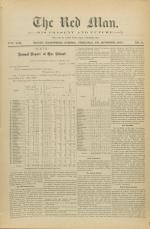
A description of this document is not currently available.
